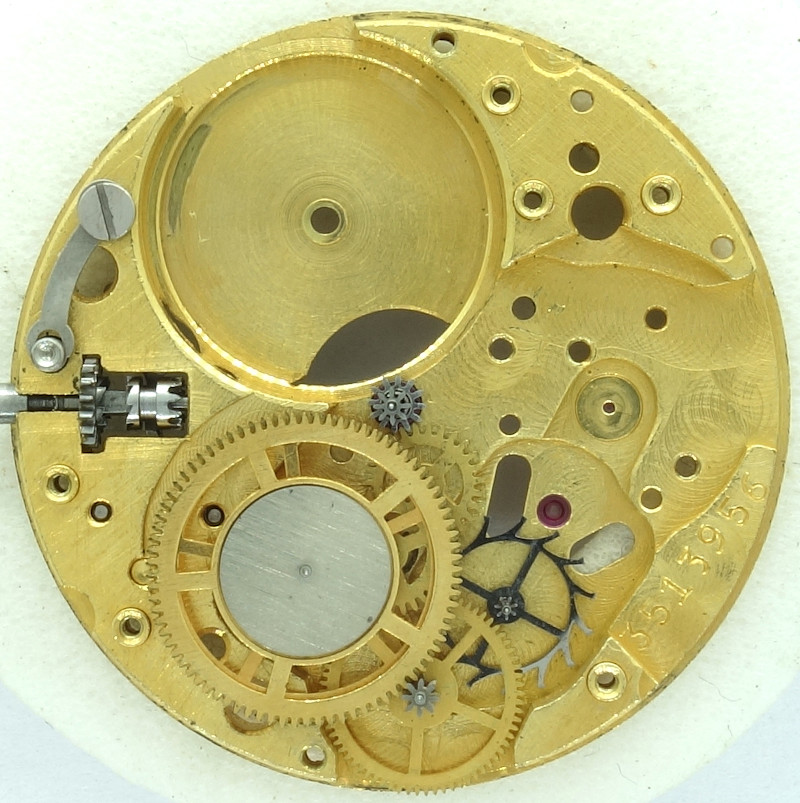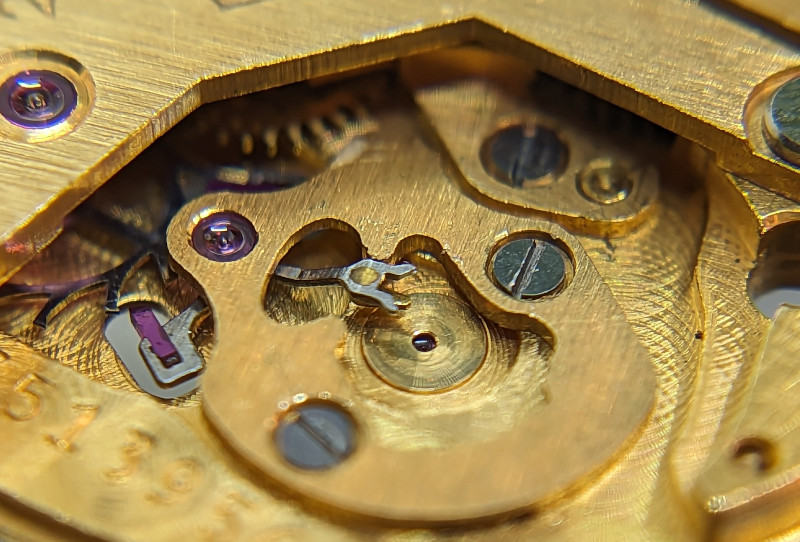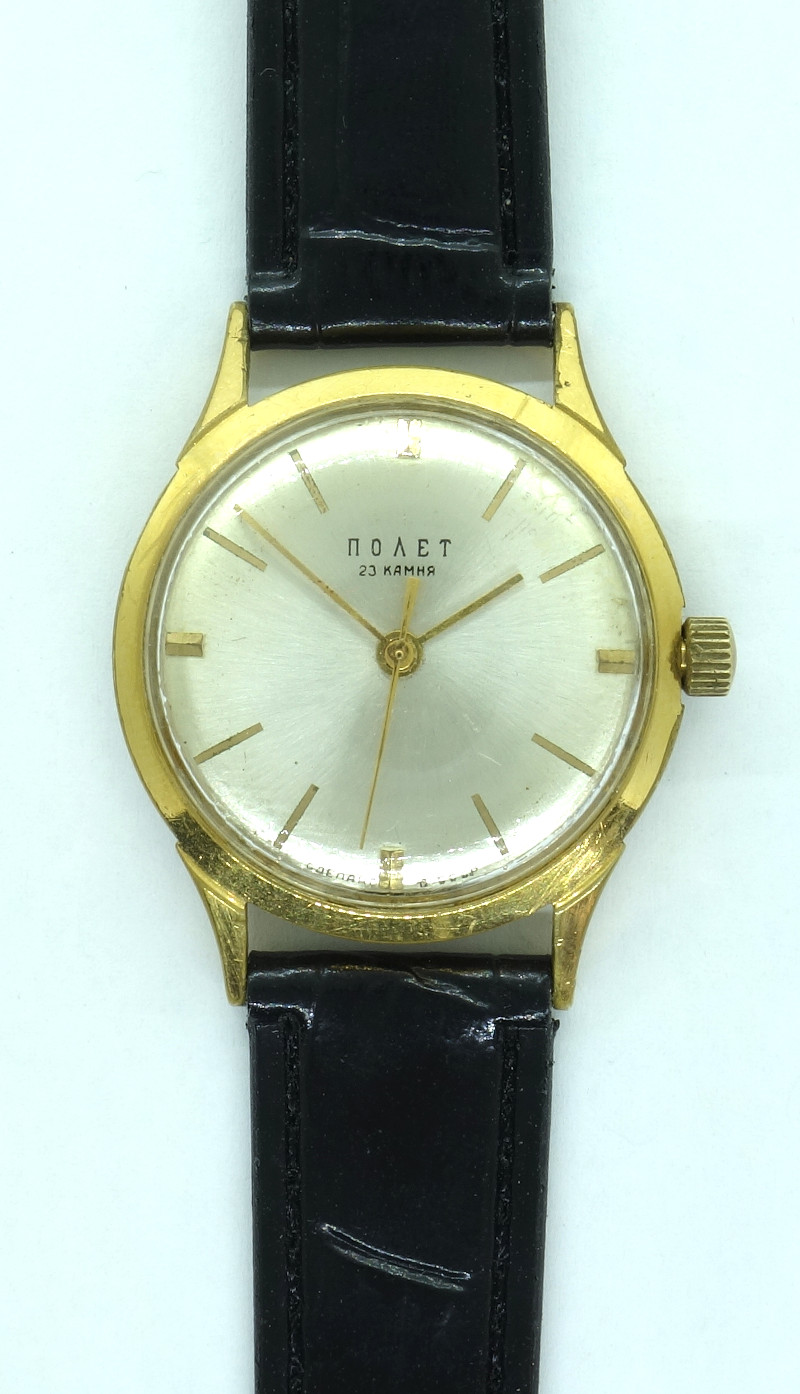Description
In 1961, the First Moscow Watch Factory (called Poljot from 1963 on) released their extra flat, only 2.9mm height, windup movement to satisfy the need for very flat wristwatches. With a diameter of only 22mm (9 3/4 lignes) it was the ideal choice for those highly demanded watches at home and abroad.
On the Leizig Trade Fair 1963, it was awarded with a gold medal and produced until 1975.
The first 1000 items, made between 1961 and 1963, are also known under the name “Wimpel” or “Vympel” (with a different hallmark of the 1MWF), afterwards the regular production started at Poljot and later at Luch.
Of course, on such a tiny movement, as low friction as possible is essential and therefor we have synthetic rubies in each all important bearings, even on the minute wheel bearing.
Besides that, the golden tone of the movement makes a great visual impression!
To reduce height to the extreme and additionaly implement a center seconds indication, they had
to reach deep into the back of tricks:
The center minute wheel, which is directly driven from the mainspring barrel drives a
pure transmission wheel, followed by another tiny reduction wheel.
The minute wheel and the two transmission- and reduction wheels are beared under their own bridge.
The tiny reduction wheel drives the double third wheel, which drives the center seconds pinion, so we have an indirect center seconds indication here. The double execution reduces flutter and jumps of the seconds hand without the need for a friction spring.
Additionally, the double third wheel drives the rather large seconds wheel, which finally drives the steel escape wheel.
For space reasons, the lever had to be bent in 3D, the fork is raised to engage into the ellipsis of the balance.
The ellipsis of the monometallic, golden toned screw balance is put directly onto the axle, not on a plateau, most probably also for height saving reasons.
The balance staff is even shock protected, in two three-leg inhouse shock protection bearings. With 18000 A/h, the movement ticks slowly. For adjustment, a tiny regulator arm with a scale can help.
For space saving reasons, the winding gear train has got two additional transmission wheels between crown- and ratchet wheel. The ratchet wheel has got an unusual small diameter, which means, that the winding force is higher, but the fewer turns of the crown are required.
The dial side is slanted on the outer edge. You can spot the yoke winding system and the cutouts for the lever pallets, which can easily be inspected and oiled.
In the lab
Timegrapher result
The impressive execution and the very flat construction promised a lot; on the timegrapher, the results are pretty well, but not as extraordinary, as you would have expected.| horizontal positions | |||
|---|---|---|---|
| dial up | -3 s/d | 290° | 3.3ms |
| dial down | -4 s/d | 291° | 3.2ms |
| vertical positions | |||
| crown right (12 up) | -5 s/d | 232° | 4.1ms |
| crown up (3 up) | -2 s/d | 238° | 3.6ms |
| crown left (6 up) | +15 s/d | 236° | 4.1ms |
| crown down (9 up) | +18 s/d | 230° | 4.4ms |
Technical data
| Manufacturer: | Poljot |
| Caliber: | 2209 |
| Size: | 9 3/4''' (measured: 22,0mm) |
| Height: | 2,9mm |
| A/h: | 18000 |
| Number of jewels: | 23 |
| Escapement: | Pallet lever |
| Balance types: | monometallic screw balance (two legs) |
| Shock protection(s): | 3 arms, russian |
| Balance bearing / direction hairspring: | Clockwise |
| Moveable stud: | no |
| Adjust mechanism: | Short regulator arm |
| Construction: |
|
| Construction type: | solid construction |
| Winding mechanism: | yoke winding system |
| Setting lever spring: | 4 holes |
| Attachment of setting lever: | plugged |
| Features: |
|
| Production years: | 1961 - 1975 |
| References: | Flume: K3 18 |
| Inventory number: | 23047 |











